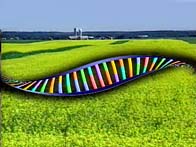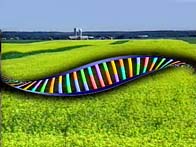Earlier this month, Mark Lynas, a leading environmental campaigner and erstwhile anti-GM food crusader, delivered a lecture to the Oxford Farming Conference that brazenly combined penitence and pugnacity, offering a public recantation of his own views on GM food while challenging those not so enlightened to "get out of the way and let the rest of us get on with feeding the world sustainably."
Although sure to offend or dismay the localist and Luddite that resides deep within so many of us, there was much to admire about Lynas's address: his honest admission of his own faults, and willingness to re-examine high-profile commitments in light of the evidence; his willingness to point out that a commitment to both environmentalism and humanitarianism requires trade-offs (we cannot feed the hungry, prevent overfishing, and oppose fish-farming simultaneously); his indictment of the self-satisfied aestheticism that lies at the heart of much of the organic food movement; his willingness to take human dominion seriously as part of the solution to, not merely the source of, environmental problems. There was also much to complain about: his occasionally bullying tone; his declaration that "the only facts that mattered were the ones published in the most distinguished scholarly journals"; his careless lumping together of all "organic" farming under one heading and declaring that whatever it was, it had no health benefits; his enthusiasm for short-term solutions and inattention to possible long-term consequences.
Any of these points merit thoughtful consideration or critique, but I will confine myself in what follows to examining the last point of admiration and, more briefly, the last point of complaint, for these get to the heart of why so many people, perhaps especially the theologically-inclined among us, have a gut distrust of genetically-modified food. If given a soapbox on which to pontificate for a few moments, my theologically-sophisticated inner Luddite might proceed as follows:
It is essential that we remember that we are creatures, and not gods, that God alone has established the course of nature and tasked us merely with tending, preserving, and overseeing it. We have not been given the Promethean freedom to take nature into our own hands and refashion it into our own image. Nature is not "raw material," but material that has already been given form and structure by God, and we must respect this God-given form; this is particularly the case with living things. If we do not, two things will happen. First, we will harm ourselves physically, for God has created the world good; he has given us the fruits of the earth as food to eat, and he knew what was good for us, so if we try and improve upon it, we are trying to outsmart God and find that we have only decreased malnutrition at the cost of increasing cancer incidence, or whatever. Second, we will harm ourselves spiritually, for we will lose all sense of our created limits, and of the inherent teleology within nature; we will conceive of ourselves and the world around us as mere products of our own will, human nature itself as clay to be shaped into whatever form we might desire. At this rhetorical climax, I might quote liberally from C.S. Lewis's The Abolition of Man, and would perhaps conclude by dolefully reciting some lines from Gerard Manley Hopkins:
"Generations have trod, have trod, have trod;
And all is seared with trade; bleared, smeared with toil;
And wears man’s smudge and shares man’s smell: the soil
Is bare now, nor can foot feel, being shod."
Chastened by Mark Lynas's address, what might we say in response to this pontification?
Well, first, we might point out that it seems to be oddly silent on the subject of the Fall, a matter of no small theological significance. If God's good creation has been disordered by sin and the curse, we might well expect that simply "doing things naturally" would get us into some trouble. Fact is, a lot of the things we try and eat can do us harm, or at any rate, can't do us enough good to protect us all from disease and malnutrition. To deny that we might need to take measures to avoid these evils of life under the sun would be tantamount to rejecting civil government because, as naturally created, we could live in harmony without it. The fact of sin means that we cannot always have our cake and eat it too; maybe it would be nice to eat all-natural fruits and vegetables, but this might conflict with the imperative to feed the starving.
More fundamentally, though, this pontification distorts the Christian tradition's understanding of nature and humans' role in it. God created the world with room to grow and mature, and the task of humans is not to curate a museum, but to enrich and perfect the garden we've been given to tend. And simplistic attempts to dichotomize between "helping something grow to its natural perfection" and "intervening so as to force it in an unnatural direction of our own choosing" won't help us much. Humans have been intervening and imposing their will on creation since the beginning, to the point that much of what we would today think of as "natural" is actually our own creation. Roses, potatoes, corn, dogs—all of these wear man's smudge and share man's smell, and are, most all of us would agree, very much the better for it. Not merely "better for us," mind you (though we might say this for the potatoes and corn, and given God's desire for a well-fed human race, this is nothing to be scoffed at), but objectively better, better in themselves. God rejoices in the wild dog, yes, but I would submit that he rejoices still more in the Golden Retriever and the Great Dane (though not, mind you, in the pit bull or the poodle). When we decided that some plants qualified as weeds, to be removed rather than left alone, and that other plants were beautiful, worthy of being cultivated and bred, rather than left alone, we made determinations about what the "natural perfection" of creation was, and what it wasn't, and "intervened" accordingly. In many cases, such interventions have helped ensure or preserve, rather than distort and destroy, balanced ecosystems.
Once we recognize that genetic modification is simply a technologically-accelerated way of doing things that already happen naturally (in cross-pollination and random mutation), or that have already happened through human ingenuity (conventional breeding methods), the prima facie theological objection to it should fall to the ground.
Login to read more
Sign in or create a free account to access Subscriber-only content.

